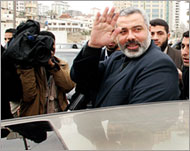Arab nations refuse to cut aid to PA
Arab foreign ministers have dismissed Western explanations for cutting aid to the Palestinian Authority after Hamas’s election victory but have offered no additional aid.

The ministers, meeting in the Sudanese capital Khartoum before an Arab summit this week, renewed a promise to give the Palestinians about $50 million a month and left open the possibility of giving more later.
They rejected plans by Ehud Olmert, the Israeli interim prime minister, to define Israel‘s borders unilaterally without dealing with a Hamas government.
The Palestinians say they face a financial emergency because Israel refuses to hand over about $55 million a month that it collects in tax and customs revenue on their behalf.
Hamas absence
Hamas might take office on Monday when the Palestinian Legislative Council convenes for a confidence vote on a 24-member cabinet dominated by the group.
A resolution approved by the Arab ministers said: “[The council of ministers] calls on the international community to continue to provide grants and financial and economic assistance to the Palestinian Authority.”
 |
|
Ismail Haniya is the prime |
It said the ministers “reject the pretexts [for threatening to cut aid] and point out the dangerous negative repercussions it would have on the economic and social circumstances of the Palestinian people and on stability and security in the region”.
The Palestinian Authority did not invite any Hamas members to join the Palestinian delegation to Khartoum.
In Hamas’s absence, the ministers reaffirmed the commitment of Arab governments to their 2002 offer to open normal relations with Israel if it withdraws to the borders as they stood on the eve of the Middle East war of 1967. Israel rejects the offer.
They added an endorsement of the US-sponsored “road map” peace plan, which commits the Palestinian Authority to disband unofficial militias such as that of Hamas.
Iraq effort
On Iraq, the ministers promised that their governments would set up a diplomatic presence in Baghdad as soon as possible, provided the Iraqi government ensures adequate protection.
Few Arab countries have diplomatic missions in Iraq, for fear insurgents would kill or kidnap their diplomats in protest at what they see as recognition of the US-backed government.
Arab governments have little leverage over the main political factions in Iraq and are worried that ethnic and sectarian divisions will weaken or fragment what used to be a powerful and influential Arab state.
UN troops rejected
Also on Sunday, Arab nations refused to endorse any deployment of UN troops in Sudan‘s troubled Darfur region without the approval of the Khartoum government.
The position, being drawn up before an Arab summit in Khartoum opening on Tuesday, falls short of Sudan’s demands for full Arab backing for its rejection of any international forces in Darfur.
The UN Security Council voted on Friday to speed plans to deploy peacekeepers to replace the African Union mission in Darfur, where the combined effect of war and difficult humanitarian conditions has left up to 300,000 people dead and an estimated 2.4 million displaced.
The move was welcomed in Washington as a step towards ending the violence in Darfur.
Darfur impasse
Lam Akol, the Sudanese foreign minister, told fellow ministers on Saturday that Sudan wanted Arab backing for the African Union mission “to abort attempts to hand over its tasks to international forces.”
The draft resolution urges “Arab countries to provide financial and logistic support to the African Union mission to enable it to pursue its tasks”.
|
“We hope that a political solution would be reached to avoid the dangers of internationalisation” Hosni Mubarak, Egyptian president |
But it says the deployment of foreign troops “should have the approval of Sudan‘s government”.
Hosni Mubarak, the Egyptian president, said he hoped a political solution would be reached to avoid international tension.
“We hope that a political solution would be reached to avoid the dangers of internationalisation,” he told the official Sudanese news agency SUNA on Saturday.
The 7000-strong African Union force, which was deployed in 2004, agreed on March 10 to continue its mission for six months.
The mission is being largely financed by the United States, Canada and the European Union.